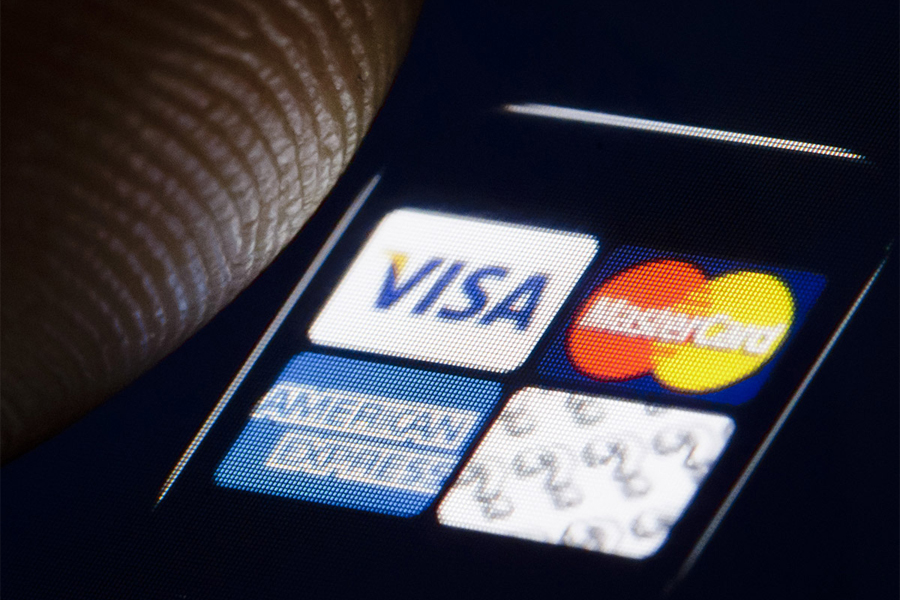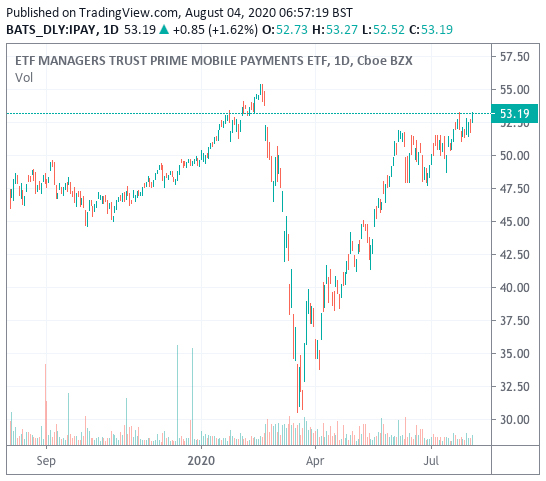
Tuesday, August 04, 2020
Crunching the numbers for the ETFMG Prime Mobile Payments ETF
By Century Financial in 'Brainy Bull'


The ETFMG Prime Mobile Payments ETF [IPAY] has had to work harder than usual to gain alpha so far in 2020. After starting the year at $49.70, it was at $52.34 as of the end of July.
The mobile payments focused fund reached a high point of $55.22 in mid-February before the mid-March COVID-19-induced plunge took it to as low as $31.51.
However, the ETFMG Prime Mobile Payments ETF —a benchmark for investors looking to benefit from growth in the mobile and electronic payments industry — has gradually recovered from the sell-off.


Digital payments boom
Amid global lockdowns, consumers and businesses are increasingly shunning cash and credit cards, as they turn to online and digital solutions.
As a result, the ETFMG Prime Mobile Payments ETF has $718.86m in net assets and a daily total return of 2.19% year-to-date.
During the past six years through to 30 June, ETFMG’s mobile payments ETF has gained almost 69%, according to analysis by the Financial Advisor, compared with a nearly 34% gain for the Schwab US Broad Market ETF [SCHB].
The IPAY ETF was first launched on 15 July 2015 by ETF Managers Group to focus specifically on the credit card network, payments infrastructure and software services, payment processing services and payment solutions market, such as smartcards, prepaid cards and virtual wallets.
It has 42 holdings including in PayPal Holdings [PYPL], which has the largest weighting at 7.04%, Square [SQ] (5.97%), Fidelity National Information Services [FIS] (5.95%), Mastercard [MA] (5.77%), Fiserv [FISV] (5.54%), and Visa [V] (5.52%).
As its biggest holding, PayPal has been a real breadwinner. PayPal’s share price jumped from $109.47 at the start of 2020 to $196.07 on 31 July as the pandemic boosts e-commerce sales.
For its second-quarter results, the company posted a 15% rise in revenue to $2.65bn as well as an 11% hike in earnings to $0.36 per share. Total payment volumes rose 29% to $86bn.


PayPal said it was planning for even more growth, as it invests in developing QR codes for services in-store and new digital wallets features such as rewards and subscription management and international growth.
Another of the ETF’s major holdings, Square has also been boosted by the accelerating shift towards cashless transactions, particularly via its mobile payment service Cash App. Square’s share price has more than doubled to $129.85 so far in 2020.
However, the other key holdings have been flatter. Fiserv’s stock is down 13% YTD, while shares in both Fidelity and Mastercard are only up 5% and 3%, respectively.
Of the main holdings, according to Market Screener, all have buy ratings apart from Square, which has a consensus hold rating.
A diversified approach to the mobile payments theme
The global mobile payment market will likely soar from $601bn in 2016 to $4.57bn by 2023, according to a Valuates report.
During the pandemic, the focus has been on customer convenience and so having the proper payments options is important to small businesses, Josh Enomoto wrote recently in InvestorPlace.


However, if this growth is subject to only pure payment stocks like PayPal and Square, it is possible to have a portfolio that doesn’t have to incorporate credit card giants such as Mastercard and Visa.
“The fund is easy to replicate with individual stocks and doesn’t appear to justify a 0.75% expense ratio,” Ben Strubel, president and portfolio manager of Strubel Investment Management, wrote in Seeking Alpha.
Despite the annual fee, there is a case to say that having diversified exposure to the payments space is a solid long-term investment.


“When we go out to dinner again, I will be with a group of friends where one will pay the bill and the rest of us will Venmo [PayPal’s Digital Wallet] our share. Clearly, we want to own this mobile payments theme,” Dan Russo, a chief market strategist, wrote in Chaikin Analytics.
COVID-19 has accelerated many trends, but one of its biggest legacies may be the death of cash and as such, it may pay to move with the times.
Source: This content has been produced by Opto trading intelligence for Century Financial and was originally published on cmcmarkets.com/en-gb/opto
Disclaimer: Past performance is not a reliable indicator of future results.
The material (whether or not it states any opinions) is for general information purposes only and does not take into account your personal circumstances or objectives. Nothing in this material is (or should be considered to be) financial, investment or other advice on which reliance should be placed. No opinion given in the material constitutes a recommendation by Century Financial or the author that any particular investment, security, transaction or investment strategy is suitable for any specific person.
Century Financial does not endorse or offer opinion on the trading strategies used by the author. Their trading strategies do not guarantee any return and Century Financial shall not be held responsible for any loss that you may incur, either directly or indirectly, arising from any investment based on any information contained herein.















